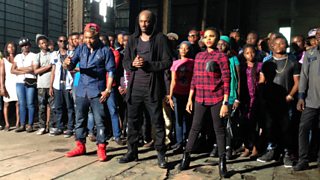Nigerian elections: We’ve had enough. No violence. Just vote.
Liberty Bunce
Project Manager, Â鶹ԼÅÄ Media Action

Nigerian music stars, 2Face Idibia, Oritsefemi and Chidinma speak out against violence in Nigeria’s 2015 elections.
One of Nigeria’s biggest stars, the singer, songwriter and producer 2Face Idibia, is standing in an abandoned Lagos power plant, saying over and over again that he’s had enough. He’s not complaining about the heat, the dust, or even the fact he’s back at work just hours after the launch party for his latest album. He’s rehearsing his lines ahead of filming a public service announcement to warn people against election-related violence.
Over 800 people were killed and more than 65,000 people displaced in three days of rioting following Nigeria’s last presidential election in 2011. So as Nigerians prepare to vote again, it’s no surprise that many feel they’ve had enough.
With Boko Haram attacks continuing, falling oil prices denting government revenues, and what looks set to be Nigeria’s closest-run presidential contest yet, the elections – currently scheduled for March 28 – come at a pivotal time for Africa’s most populous country and largest economy.
Nigeria has a vibrant, competitive media sector. And over the past few months we’ve helped radio and TV stations engage voters, promote peaceful elections, and provide platforms for the public to question leaders on this landmark election’s most pressing issues.
Questioning leaders
At our “town hall meeting” style radio debates conducted in both English and Hausa, audiences have asked leaders how prepared they are to tackle election fraud, provide security and ensure the participation of marginalised groups. Referring to the murder of election workers in 2011, audience member Eze Nwagwu, for example, asked the police official in charge of overall election security “What kind of protection do we provide election officials after they have finished their job and [the results] did not favour a particular group?”
It hasn’t always been easy to run these debates. Shortly before we were scheduled to record in the northern city of Kano, a suicide bombing at a petrol station killed six people, putting extra pressure on all of us to ensure our audiences, panellists, and crew were as safe as possible.
Along with our own programmes we have mentored local radio stations to produce their own debate programmes and to improve the quality of their reporting, as well as helping station managers to handle political pressure during the elections. No matter who wins, we’re hoping to give journalists the skills to create future programmes that let audiences hold their elected officials to account.
Dramatic licence
We’re using drama to explore the choices people must make during elections – and the impact of those choices on their lives. In , our weekly radio soap opera, for example, a marriage was recently put to the test when Gyang and Julie clashed over accepting bags of rice doled out by politicians to buy votes. Similar storylines featuring fictional, local elections feature in our Hausa drama (Telling a Story).
We always try to make our dramas as exciting, impactful and topical as possible but even we were surprised when a suspected hacking of the electoral commission’s computers made headlines across Nigeria recently. Our team had written a similar storyline for just a couple months before.
Youth-focused PSAs
And of course, there are the PSAs. In previous elections, young people have taken part in electoral violence and intimidation, often encouraged by rival political factions. Our and language PSAs featuring 2Face and other stars encourage young Nigerians to set their own agenda for the election while eschewing election violence. These PSAs broadcast nationally on a number of TV stations, and have also been shared widely on social media.
Similarly, a series of and PSAs produced in English, Pidgin, Hausa, Igbo and Yoruba encourage young people to turn up and exercise their right to vote.
Countdown to the vote
There is a lot of uncertainty surrounding the upcoming polls. Not all eligible voters have received their voting cards yet and holding elections in the north east states affected by Boko Haram remains a challenge. Security in that part of the country was the reason given for postponing the elections (originally scheduled for Saturday 14 February 2015) until the current late March timeline, although it remains to be seen if the situation improves.
Whatever date the elections take place, we feel confident Â鶹ԼÅÄ Media Action’s work over the past few months will have helped Nigeria’s media act as a more positive force in this campaign.
Related links
•
• Follow Â鶹ԼÅÄ Media Action on and
•
•
•
